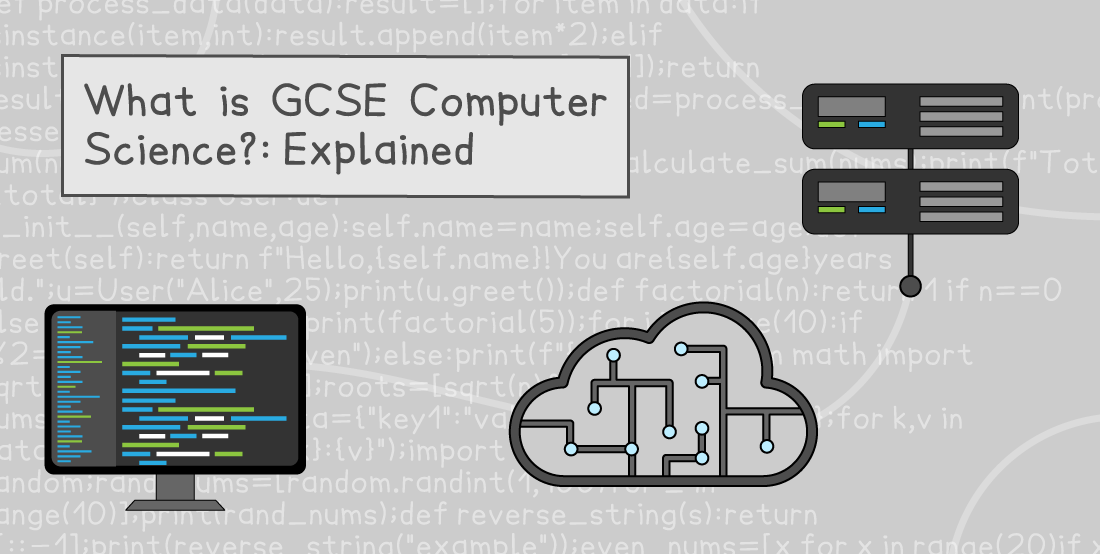What is GCSE Computer Science?: Explained
Written by: James Woodhouse
Reviewed by: Robert Hampton
Last updated

Contents
- 1. What is GCSE Computer Science?: Quick summary
- 2. Is Computer Science a hard GCSE?
- 3. What is the difference between ICT and Computer Science at GCSE level?
- 4. Why study Computer Science at GCSE?
- 5. What does GCSE Computer Science cover?
- 6. How is GCSE Computer Science assessed?
- 7. What skills will students learn?
- 8. What jobs can you get with a Computer Science GCSE?
- 9. Top tips for success
- 10. Get a 9 with Save My Exams
GCSE Computer Science can seem challenging however, with the right approach and guidance, it’s an incredibly rewarding subject. In this article, we will explain what GCSE Computer Science is, why it’s worth studying, and how you can succeed. By the end, you’ll have answers to all your questions and tips to help you feel confident tackling the subject, should you choose it for one of your GCSE options.
What is GCSE Computer Science?: Quick summary
GCSE Computer Science is a UK qualification that teaches students the principles of computing and programming. It’s designed to enhance both theoretical knowledge and practical skills in areas such as:
Algorithms and problem-solving
Programming languages and techniques
Data representation (binary, hexadecimal)
Computer systems and networks
Cybersecurity and preventative measures
The ethical and legal implications of technology
Is Computer Science a hard GCSE?
The difficulty of GCSE Computer Science, like all other subjects, depends on your interests and how much effort you’re willing to put in. If you enjoy logical thinking, problem-solving, and working with technology, you’ll likely find it manageable and enjoyable.
However, it is a subject that requires dedication because of its mix of theory and programming. Students often find they need to dedicate additional time outside of the classroom to keeping their programming skills sharp, as this is a vital skill to performing well in the subject.
Why some students find computer science hard
Lack of exposure at Key Stage 3: Students who have not learned much of the content during Key Stage 3 (years 7,8 and 9) often find the start of the GCSE content more challenging than those who have had many lessons over the prior 3 years
Abstract concepts: Topics like binary and algorithms can be tricky to grasp at first
Programming Challenges: Writing code in languages like Python takes practise and persistence. These skills must be developed over a long period of time
Mix of theory and practical: You’ll need to apply theoretical knowledge to solve practical problems, which can be tough without regular practise
Top tips to make Computer Science easier
Practise regularly: Programming requires hands-on experience, so coding regularly is key
Use visual aids: Diagrams and flowcharts can help you understand abstract concepts, as well as online tutorials which can help retain knowledge and simplify complex ideas
Use high-quality resources: Platforms such as Save My Exams can provide you with effective use of, revision notes, past papers, practise exam questions and more to reinforce your learning
What is the difference between ICT and Computer Science at GCSE level?
While both subjects involve computers, they focus on very different aspects:
ICT (Information Communication Technology) Is all about learning to use tools such as spreadsheets, databases, and presentation software
Computer Science is centred around understanding how computers work, learning the fundamentals of programming, and solving problems
Often, the two subjects appeal to different styles of learners. Students who enjoy creative freedom and enjoy creating content, graphics and more often perform well in a more practical subject such as ICT.
On the other hand, students who enjoy problem-solving, breaking down problems, and learning new theoretical concepts often enjoy the challenges and content of Computer Science.
Why study Computer Science at GCSE?
Computer Science opens doors to the tech-driven world we live in. By studying this subject, you develop a range of skills that not only apply to the subject itself, but are transferable skills that can be used in a variety of different industries. The skills you will develop whilst studying Computer Science are:
Problem-decomposition Skills: Learn how to break down complex problems into manageable steps
Abstraction: focusing on only the important information in a given problem and ignoring any irrelevant information
Programming and algorithms: Gain hands-on experience in programming, an essential skill in many careers. You will also learn how to read and develop algorithms, an additional skill which is applicable in many industries, including mathematics, engineering, software development and more.
What does GCSE Computer Science cover?
The course content and order vary slightly between exam boards. The teaching order will also differ from school-to-school however, the exam boards all have to cover common topics. Within each section, there are multiple topics covered, but the list gives you a good brief overview. The list of topics covered by each exam board are listed below:
AQA
Fundamentals of Algorithms
Programming
Fundamentals of Data Representation
Computer Systems
Boolean Logic
Programming Languages & Translators
Systems Architecture
Memory & Storage
Fundamentals of Computer Networks
Cyber Security
Relational Databases & Structured Query Language
Ethical, Legal & Environmental Impacts of Digital Technology
Start learning: AQA GCSE Computer Science Revision
OCR
Systems Architecture
Memory & Storage
Computer Networks, Connections & Protocols
Network Security
Systems Software
Ethical, Legal, Cultural & Environmental Impacts of Digital Technology
Algorithms
Programming Fundamentals
Producing Robust Programs
Boolean Logic
Programming Languages & Integrated Development Environments
Start learning: OCR GCSE Computer Science Revision
Edexcel
Computational Thinking
Data
Computers
Networks
Issues & Impact of Digital Technology
Problem Solving with Programming
Start learning: Edexcel GCSE Computer Science Revision
You can read more about the contents of each exam board's specifications on their website.
How is GCSE Computer Science assessed?
Assessment methods vary by exam board, but typically include:
Exam Board | Components | Weighting |
AQA | Two written exams | 50% each |
OCR | Two written exams | 50% each |
Edexcel | One written exam, one on-screen programming exam | 50% each |
For more past papers, view them on our GCSE Computer Science page.
What skills will students learn?
Studying GCSE Computer Science equips you with essential skills that are highly valued. As a subject, Computer Science covers a wide range of topics and areas, the main pillars of the subject are listed below.
Abstraction
Learn how to focus on the important details of a problem while ignoring irrelevant information, helping you solve complex issues efficiently. This is a particularly valuable skills when learning to program, as students can often find larger programming challenges overwhelming. By focusing on only the essential parts of the problem and abstracting/removing the unnecessary details, the problem becomes easier to solve.
Decomposition
Decomposition is the breaking down of larger problems into smaller, more manageable parts, making it easier to develop a solution. In the world of algorithms and programming, this is an essential skill, as it means solving much smaller problems. It also means that some problems can be solved by other people, making your job as a programmer easier, too.
Computational Thinking & Logical Reasoning
Logical reasoning is the ability to both create and follow a step-by-step process to solve problems and predict outcomes. In GCSE Computer Science, students often have to follow an algorithm and trace the outcome of it. This is an excellent skill that uses the problem-solving part of the brain and is a skill which can be easily transferable to subjects such as Science and Maths.
When students ask me “What is GCSE Computer Science?”, the simple answer I would give is that it is an excellent subject, which will help you develop and whole host of brand new skills. It will present you with a range of challenges and help you to learn new theory topics, and how to program. It will also develop your writing skills and exam techniques.
What jobs can you get with a Computer Science GCSE?
A Computer Science GCSE, when accompanied by other subjects and then further qualifications, can lead to exciting career paths such as:
Software Developer
Game Developer
Data Analyst
Cybersecurity Specialist
Network Engineer
AI and Machine Learning Technician
It is worth noting that GCSEs alone are not sufficient to get you into these roles, however, working hard across all subjects and then selecting appropriate A Levels and degree qualifications/apprenticeships would help lead to these potential career paths.
Top tips for success
Start early: Begin practising programming skills as soon as possible
Use revision tools: Explore past papers, revision notes and online exam questions to develop and test your knowledge
Seek help when needed: Don’t hesitate to ask your teacher or explore platforms like Save My Exams for support to help ensure you achieve the best grade possible with the minimal amount of effort on your part
Get a 9 with Save My Exams
Ready to ace your GCSE Computer Science? Save My Exams provides carefully crafted revision materials by expert teachers to help you succeed in achieving top grades!
Explore Our GCSE Computer Science Revision Resources
References
OCR GCSE Computer Science J277 specification
AQA GCSE Computer Science 8525 specification
Pearson Edexcel GCSE Computer Science 1CP2 specification
Sign up for articles sent directly to your inbox
Receive news, articles and guides directly from our team of experts.

Share this article


 written revision resources that improve your
written revision resources that improve your